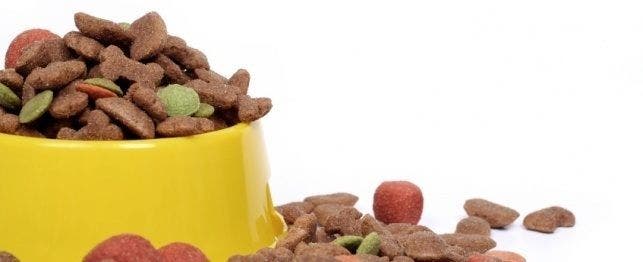
Does Crunchy Food Prevent Dental Disease in Dogs?
Does feeding dry food or crunchy food to your dog make a difference in his teeth or prevent dental disease?
When it comes to dental health, should you feed your dog’s crunchy kibbles or the meaty moist stuff? It’s a question I should get almost every single day…but don’t. If my experience is any guide, that’s because people assume they know the answer. Unfortunately, it’s not always the right one.
When it comes to formulating the ideal diets for dogs there are lots of things to consider. What’s more, the variables involved in finding the perfect diet for an individual animal are endless.
But let’s focus on one thing: what’s the best food for your dog’s teeth?
What’s the Best Food for your Dog’s Teeth?
It’s a great question, because there’s no one right answer for every pet.
Conventional wisdom says that crunchy food is better for dental health because the chewy friction created by kibbled diets usually means less plaque. For the most part, studies do support the positive effect of chewing hard or crunchy foods on dental health.
But to what extent does the shape, size and texture of the stuff matter when it comes to chewing? And are all crunchy foods created equal?
Actually, some crunchy foods do next to nothing for pet teeth while others have passed rigorous standards and are proven to reduce plaque. This is the measure of any successful dental health product’s true power (check out VOHC.org for more comprehensive information on these tests).
Finally, consider this: individual chewing behavior varies from dog to dog. Is every piece of kibble being chewed or are those lumps simply swallowed? Some pets are gulpers; these hungry ones bypass mastication altogether. If your dog is a non-chewer, there’s no way that even the most effective tartar-preventing foods will do anything for their teeth.
Not surprisingly, all these dental issues are under serious scrutiny by dog food companies around the world. Plaque reduction potential in particular is being rigorously evaluated and hotly debated by nutrition researchers. This only makes sense; after all, we now know that pet longevity is strongly correlated with oral health, even after correcting for issues such as owner income and willingness to seek veterinary care.
That’s why teeth deserve far more attention than most owners realize-and why pet food companies feel an increasingly strong sense of responsibility for ensuring that their formulas optimize dog dental health.
Their heightened interest only stands to reason; it’s good business.
To What Extent Is The Average Crunchy Diet Better Than Any Non-Crunchy Diet?
But here’s what the cynic in me has to ask: to what extent is the average crunchy diet better than any non-crunchy diet?
Now let’s go one further: even if the diet has been scientifically proven to reduce plaque, does that “significant plaque reduction” actually result in clinically relevant improvement in dog dental health? In other words, we can surmise that reducing plaque is helpful to a dog’s overall dental health and wellness, but how helpful is something else entirely. Long-term studies on canine oral health will have to be undertaken before we’ll know.
Does Crunchy or Dry Food Make a Difference in Your Dogs Teeth?
The answer to our question is short. No, we don’t know whether dogs fed a lifetime of crunchy food (including proven plaque-reducers) suffer less periodontal disease than those that eat foods that are not specifically proven to reduce plaque.
You may think all this speculation is irrelevant or trivial but I assure you it’s not. For example, many of my patients whose medical conditions require moistened foods (such as overweight cats or cats and dogs with specific urinary issues) come attached to owners who fear wet foods, citing concern for their dog’s dental health.
Plenty of dog owners are resistant to feeding moist foods (even when their pets really need it!) because they assume their pets’ teeth will suffer. Meanwhile, I explain, there’s scant evidence to prove their pets are any better off eating crunchy food…and plenty of evidence to suggest that some diseases and specific health concerns require the softer stuff.
Despite my pleas, protestations and explanations, my clients are often quite resistant. They’ve heard too much about the positive effects of crunchy dog treats to reverse their Madison Avenue-informed thinking. If only I could reverse 50-plus years of pet food marketing I could perhaps make some headway here. Sigh…
I hope this gives you more information about if dry or crunchy food helps your dog’s teeth.